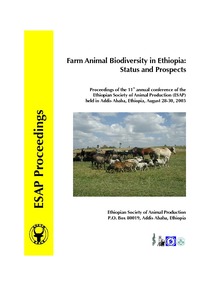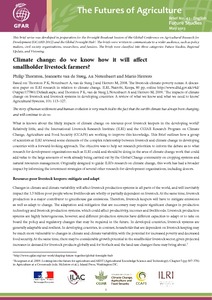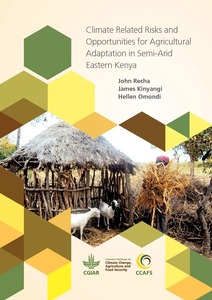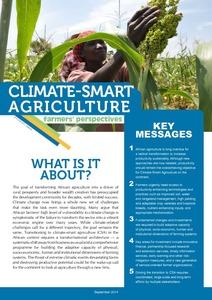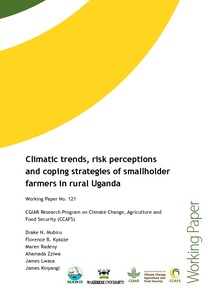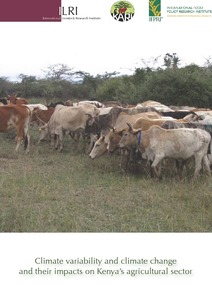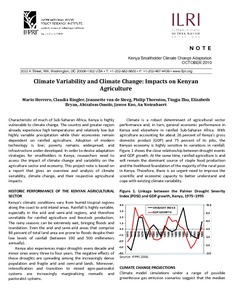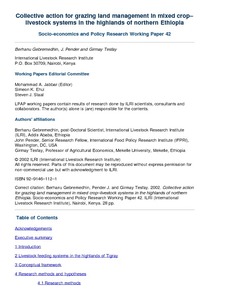parcours
AGROVOC URI:
Climate change: do we know how it will affect smallholder livestock farmers?
What is known about the likely impacts of climate change on resource-poor livestock keepers in the developing world? Relatively little, and the International Livestock Research Institute (ILRI) and the CGIAR Research Program on Climate Change, Agriculture and Food Security (CCAFS) are working to improve this knowledge. This Brief outlines how a group of scientists at ILRI reviewed some elements of the complex relationship between livestock and climate change in developing countries with a forward-looking approach.
Climate readiness in smallholder agricultural systems: lessons learned from REDD+
The debate around the role that agriculture should play in mitigating climate change and sequestering greenhouse gases is politically complex and technically complicated. In many countries, and particularly in developing countries with a large smallholder population, the agricultural sector faces competing priorities, such as national food security goals, poverty alleviation, addressing natural resource degradation and adapting to the already visible effects of climate change.
Climate Related Risks and Opportunities for Agricultural Adaptation in Semi-Arid Eastern Kenya.
This report contains information on a field assessment of risks associated with climate variability in eastern Kenya. It also includes the compilations of climate related agricultural risks gathered from a Kamba radio dialogue with local communities of Eastern Kenya, aired from January to April 2012. It highlights the significant potential in the region for mitigating climate change through improved management of agricultural land and crop and livestock husbandry practices, as well as on tapping into the wide range of traditional knowledge of the local communities.
Climate Smart Agriculture in the African Context
Agriculture remains vital to the economy of most African countries and its development
has significant implications for food security and poverty reduction in the region. Increase
in agricultural production over the past decades has mainly been due to land area expansion,
with very little change in production techniques and limited improvement in yields.
Currently one in four people remains malnourished in Africa. CSA integrates all three dimensions of sustainable development and is aimed at (1)
Climate-smart agriculture success stories from farming communities around the world
To ensure a food-secure future, farming must become climate resilient. Around the world, governments and communities are adopting innovations that are improving the lives of millions while reducing agriculture’s climate footprint. These successful examples show the many ways climate-smart agriculture can take shape, and should serve as inspiration for future policies and investments.
Climate-Smart Agriculture: Farmers' Perspectives
Transitioning to climate-smart agriculture (CSA) in the African context requires a transformational architecture — a systematic shift away from business as usual and a comprehensive programme for building the adaptive capacity of physical, socio-economic, human and institutional dimensions of farming systems. Manyewu Mutamba of the Southern African Confederation of Agricultural Unions (SACAU) and Mainza Mugoya of the Eastern Africa Farmers Federation (EAFF) argue that African agriculture is long overdue for a radical transformation to increase productivity sustainably.
Climate-Smart Livestock Interventions in West Africa: A Review
The livestock sector is one of the major contributors in agriculture, by some estimates
contributing up to 18% of the global greenhouse gas (GHG) emissions. Of this, about one
third is reported to be due to land use change associated with livestock production, another
one third is nitrous oxide from manure and slurry management, and roughly 25% is attributed
to methane emissions from ruminant digestion. Recent analysis suggests that developing
world regions contribute about two thirds of the global emissions from ruminants, with sub-
Climatic trends, risk perceptions and coping strategies of smallholder farmers in rural Uganda
Smallholder farmers in Uganda face a wide range of agricultural production risks, with climate change and variability presenting new risks and vulnerabilities. Climate related risks such as prolonged dry seasons have become more frequent and intense with negative impacts on agricultural livelihoods and food security.

